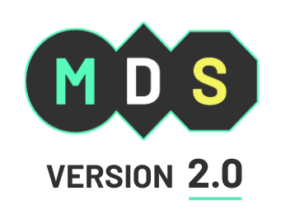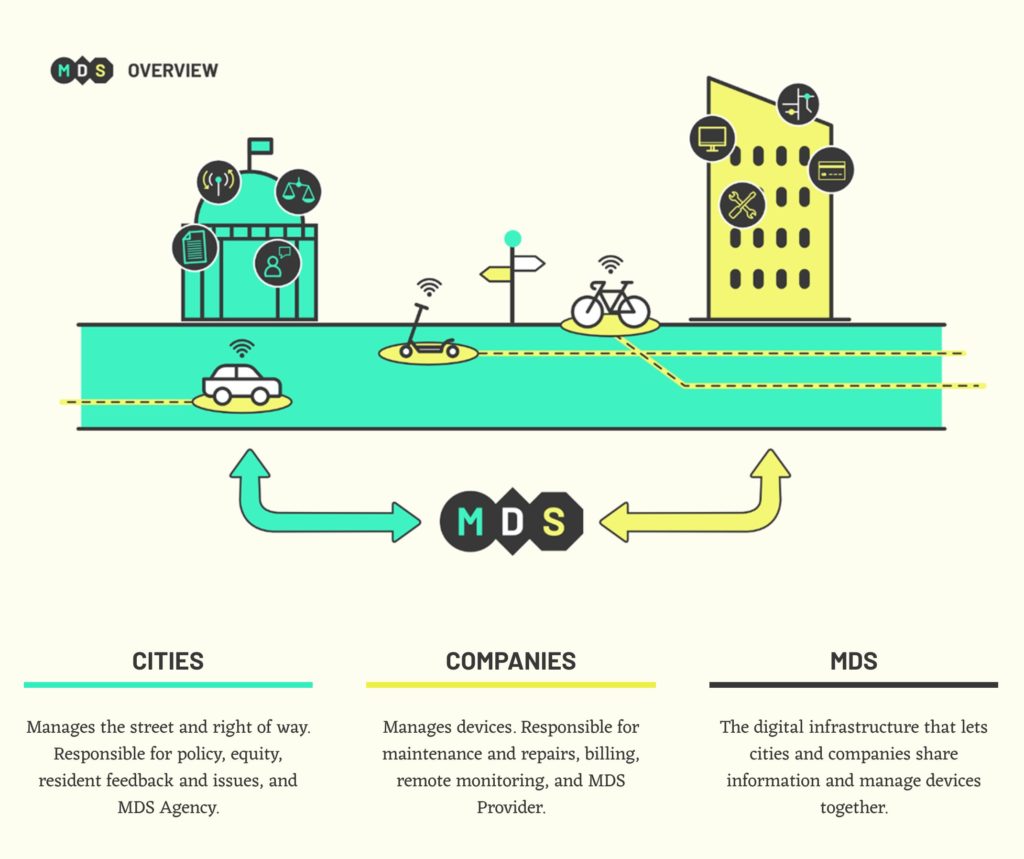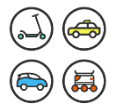
AN OFFICIAL RELEASE
Over the past year and a half, we’ve collaborated with stakeholders from across the mobility ecosystem to develop the Mobility Data Specification (MDS) 2.0. This digital tool facilitates data-informed regulation, scalable deployment of new mobility services, and the management of public space for the public good. We’re excited to announce that MDS 2.0 has now been officially released. Our Board of Directors approved it this week and we shared the news with global mobility and technology leaders at the CoMotion MIAMI Conference.
“The launch of MDS 2.0 is a significant milestone for the OMF. MDS is no longer just a data specification for micromobility and has any number of future applications as well. We’re excited to see how cities and mobility providers will leverage the new specification to enhance their mobility services and improve the lives of the traveling public around the world.”
– Andrew Glass Hastings, Executive Director of the Open Mobility Foundation
ABOUT THE MOBILITY DATA SPECIFICATION
Initially created in 2018 to address the needs of micromobility, MDS is a global open-source standard that helps cities manage shared mobility in the public right of way. A “two-way street,” MDS standardizes communication and data-sharing between public agencies and private mobility providers, giving cities the tools they need to improve safety, equity, and quality of services on their streets. At the same time, it provides a consistent playbook for mobility providers.

Bringing years of collective knowledge and success to the development process, MDS 2.0 was created through OMF’s unique open source governance model and incorporates feedback from hundreds of people representing organizations across the public and private sectors. We had two main goals: to simplify the spec and make it easier for companies and public agencies of all sizes to implement, and to design a more flexible tool that could accommodate new shared modes and keep up with future innovations in mobility.
MDS 2.0 represents a significant advancement in OMF’s mission to transform mobility in the digital age. Major changes include:
 Flexible Data Formats for New Modes: MDS is now more versatile than ever. In addition to shared e-scooters and bikes, MDS supports passenger services (like taxis and ridehail), car-sharing, and delivery robots.
Flexible Data Formats for New Modes: MDS is now more versatile than ever. In addition to shared e-scooters and bikes, MDS supports passenger services (like taxis and ridehail), car-sharing, and delivery robots.
 Policy Improvements: We’ve expanded and refined the Policy API, which enables cities to set and digitally share rules for where and how different shared vehicles can operate. The changes makes it easier to understand and implement policies.
Policy Improvements: We’ve expanded and refined the Policy API, which enables cities to set and digitally share rules for where and how different shared vehicles can operate. The changes makes it easier to understand and implement policies.
 Agency/Provider Alignment: MDS’s primary APIs allow cities and providers to communicate in different ways. With MDS 2.0, both share the same data types, endpoints, and fields, which streamlines the specification and eases implementation.
Agency/Provider Alignment: MDS’s primary APIs allow cities and providers to communicate in different ways. With MDS 2.0, both share the same data types, endpoints, and fields, which streamlines the specification and eases implementation.
HOW CITIES AND COMPANIES ARE USING MDS
For nearly five years, more than 160 cities and public agencies around the world have been successfully using MDS to manage shared mobility programs and improve transportation systems for the public’s benefit. Here are just a few examples:
Increasing access and equity: Cities use MDS to establish and measure the impact of equity programs that require service availability or other operational requirements, especially to residents in historically underserved areas.
“As public agencies, we want to welcome innovation into our cities without compromising on key priorities like safety, access, and equity. In Los Angeles, MDS allows us to provide more choice for people to get to where they need to go, like with our dockless mobility program that last year provided more than 8 million trips citywide including in communities long underserved by transportation options. We’re looking forward to using the latest version to build on this great work.”
– Connie Llanos, Interim General Manager at Los Angeles Department of Transportation (LADOT) and member of the OMF Board of Directors
Ensuring safety and compliance: To protect pedestrians, ensure access for people with disabilities, follow up on safety reports, and address consumer protection concerns, cities set rules like speed limits, parking and operating areas, or labor requirements. MDS allows cities to measure compliance with these rules and take action when mobility operators do not comply, creating safer, more inviting public spaces.
“The use of data and digital tools in NYC has been a game-changer, enabling us to advance pay equity for drivers, improve street safety, and tackle traffic congestion. MDS has become a key component of public agencies’ data and mobility management strategies. With the release of MDS 2.0, the specification continues to evolve and enhance its ability to help cities keep pace with future innovations in the space.”
– Ryan Wanttaja, First Deputy Commissioner for the New York City Taxi and Limousine Commission (NYC TLC)
Infrastructure planning: Route data from MDS allows cities to improve safety through better infrastructure planning, and measure the efficacy of their investments.
Supporting public transit: Cities rely on MDS to understand how shared mobility services support public transit access, and to encourage that modal link to further their climate and equity goals.
“Digital infrastructure is essential to the City of Bergen’s micromobility program, and MDS is at the heart of it. As we invest in physical infrastructure, we must also continue to develop digital infrastructure that allows cities to manage mobility in the modern era. MDS 2.0 is a major advancement, providing added flexibility to help us improve safety and sustainability, and meet key policy goals for micromobility, for car sharing, and beyond.”
– Lars Petter Klem, Project Manager of Sustainable Mobility for the City of Bergen, Norway
PRIVACY, POLICY, AND OTHER RESOURCES
Whether you’re ready to implement MDS 2.0 or just looking for more information, the OMF has a variety of resources available to help get you started:
General: Find an MDS overview with diagrams and links to key resources on our website
GitHub Repository: Review the MDS 2.0 code release and related discussion and contributions
Policy Guidance: View sample policy language and guidance for cities that wish to write MDS 2.0 into their operating policy, permits, tenders, or RFPs and communicate upgrade plans to providers, city technology departments, third parties, and/or contractors
Privacy Resources: Learn more about the OMF’s work to support and enhance privacy practices, including key resources for cities and companies using MDS
WHAT’S NEXT FOR MDS
Already, more than a dozen organizations are dedicated to upgrading to the newest version of the specification, including the cities of San Francisco, Portland, Los Angeles, San José, Denver, and Miami-Dade County to name a few, plus technology companies and operators including Kiwibot, Populus, Lacuna, Blue Systems, and Ride Report. The OMF is convening an upgrade cohort to support cities and companies in their implementation process. To join, sign up for the mailing list to get meeting invites, updates, and access resources.
MDS 2.0 was built collaboratively in a public working group regularly attended by public agencies, companies, subject matter experts, and the public. The group spent more than a year gathering use cases, discussing technical solutions, and collecting feedback from real-world experience. A steering committee made up of OMF member organizations leads the MDS Working Group, including the cities of San Francisco, San José, Detroit, and Denver, Miami-Dade County, and the San Diego Association Governments, as well as Blue Systems, Lacuna, and Populus. Community input and engagement will continue to shape the specification as it evolves to incorporate additional modes in the future. To participate in the development of MDS:
- Sign up for the MDS Working Group mailing list to get meeting invites, agendas, and important updates
- Join bi-weekly meetings (Thursdays, 12pm ET) to discuss issues and hear from other contributors
- Follow progress and chime in on our MDS GitHub repository





